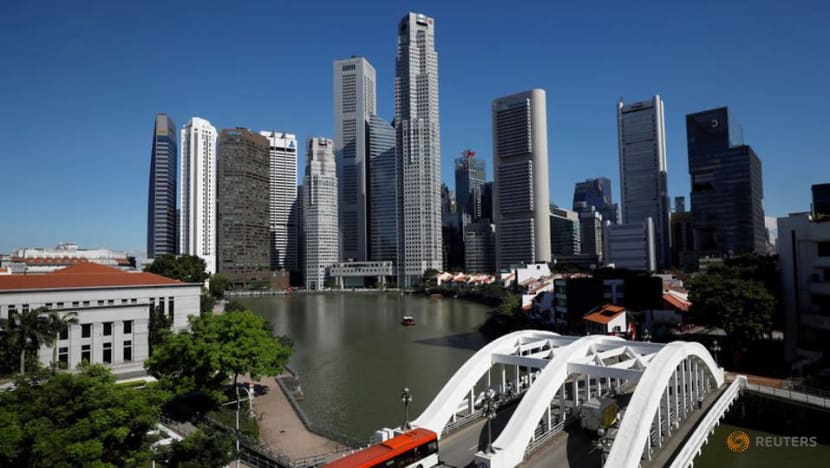Singapore studies UN’s latest climate change report as it continues to plan and implement adaptation measures

View of the central business district in Singapore, May 24, 2018. (File photo: Reuters/Edgar Su)
SINGAPORE: The Centre for Climate Research Singapore is studying findings from the UN’s latest climate change report to see how they impact Singapore and to inform its policy recommendations.
On Monday (Aug 9), the UN’s Intergovernmental Panel on Climate Change (IPCC) released a major report detailing the latest scientific assessments of climate change. It is the first of three reports which will make up the panel’s Sixth Assessment Report.
The panel’s key findings include the clear influence of humans on climate change, resulting in the warming of the atmosphere, ocean and land.
It warned that unless deep – and quick – cuts in carbon dioxide and other greenhouse gas emissions are made, global surface temperatures will cross the 1.5 degrees Celsius threshold goal of the 2015 Paris Agreement sometime in the early 2030s.
In the most aggressive emission scenario, the world could exceed that mark by the end of this decade.
Today, the world is more than 1 degree Celsius hotter than it was during the pre-industrial period from about 1850 to 1900.
Different emissions scenarios also show that the world will exceed the Paris Agreement’s 2 degrees Celsius threshold goal by this century.
In addition, the report found that every region in the world is projected to experience more extreme droughts, intense and frequent rainfall, and flooding.
Related:
Singapore said the findings underscore the urgency for the global community to reduce greenhouse gas emissions.
“Singapore is committed to play our part. The Government will rally and partner Singaporeans and businesses to advance our national agenda on sustainable development, as set out in the Singapore Green Plan 2030,” said the Ministry of Sustainability and the Environment (MSE) and Meteorological Service Singapore (MSS) in a press release.
“We will also leverage climate science to understand the effects of climate change on Singapore and press on with efforts to mitigate and adapt to them.”
AREAS OF CONCERN
The authorities highlighted three areas of concern – changes in temperature, rainfall and sea level rise – as well as their implications for Singapore.
Findings from the summary for policy makers, which was released together with the IPCC report, suggest that Singapore could feel elevated temperatures in the coming decades, said the MSE and MSS.
It is a concern for the country, which is already heating up faster than the rest of the world. Singapore’s annual mean temperatures have been steadily climbing from 26.9 degrees Celsius in 1980 to 28.0 degrees Celsius last year.
Seven of the top 10 hottest years also fell within this decade, according to data from the MSS website.
This is largely due to the urban heat island effect, where the heat generated from human activities are trapped by urban surfaces such as buildings and roads.
Aside from this, Singapore may also see more intense and frequent rainfall, with global precipitation projected to increase with each additional degree of warming.
Since 1980, the country’s average annual rainfall has increased at an average rate of around 70mm per decade. The intensity and frequency of heavy rainfall events have also increased over the past few decades up until 2012, but these trends were modulated by strong El Nino conditions in 2015 to 2016, the press release said.
While it is challenging to pinpoint the cause of past rainfall changes in Singapore with current models due to a combination of factors, MSS said it will continue to study this, along with the impact of climate change on the country’s weather.
RISING SEA LEVELS
Another area of concern for low-lying countries like Singapore is rising sea levels.
The report warned that under a low emission scenario, global mean sea levels could rise between 0.32m and 0.62m by the turn of the century. Under the highest emission scenario, sea levels could rise between 0.63m and 1.01m.
Related:
The report also said sea level rise is virtually certain to continue throughout the 21st century in most regions of the world.
While sea level change is not globally uniformed, and regional and local rates of sea level rise may differ from the global mean, MSE and MSS said Singapore will study sea level rise in “greater detail” under a national programme that aims to strengthen local research and provide more robust projections of sea level change for the country and the surrounding region.
Findings from the national sea level programme will be contextualised by the Centre for Climate Research, which will also study their impact on Singapore.
Related:
In the meantime, the centre has started work on its third national climate change study which will provide “localised and high-resolution” climate projections derived from the latest climate models used in the UN report.
The study is expected to be completed by end-2022. The findings will guide the planning and implementation of adaptation measures to safeguard Singapore against the impact of climate change, said MSE and MSS.
These measures will be continually reviewed and adjusted, as new knowledge and information on the effects of climate change become available, they added.
A virtual symposium on climate change will also be held later this month to discuss the scientific findings of the report.















